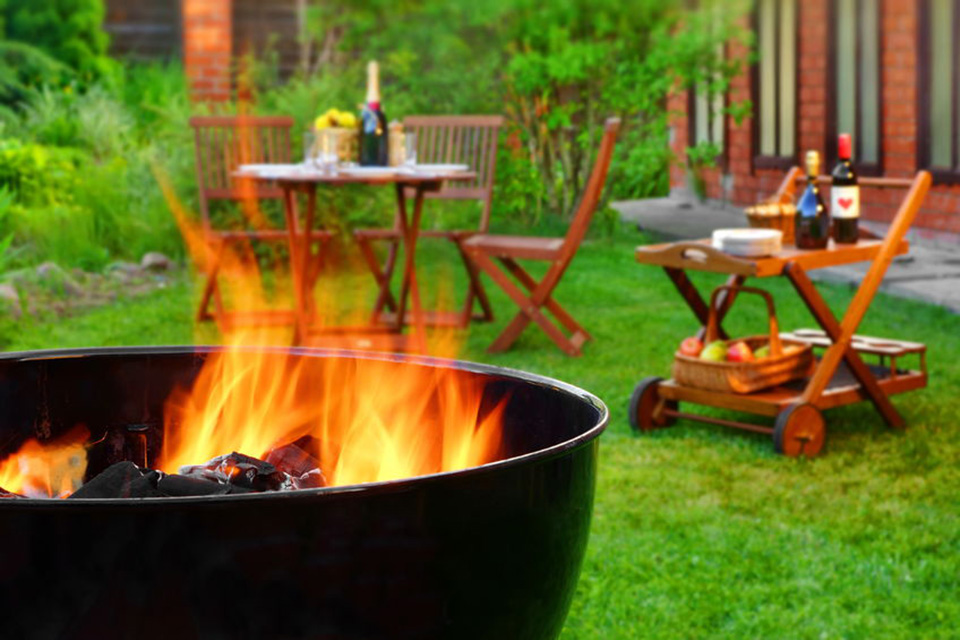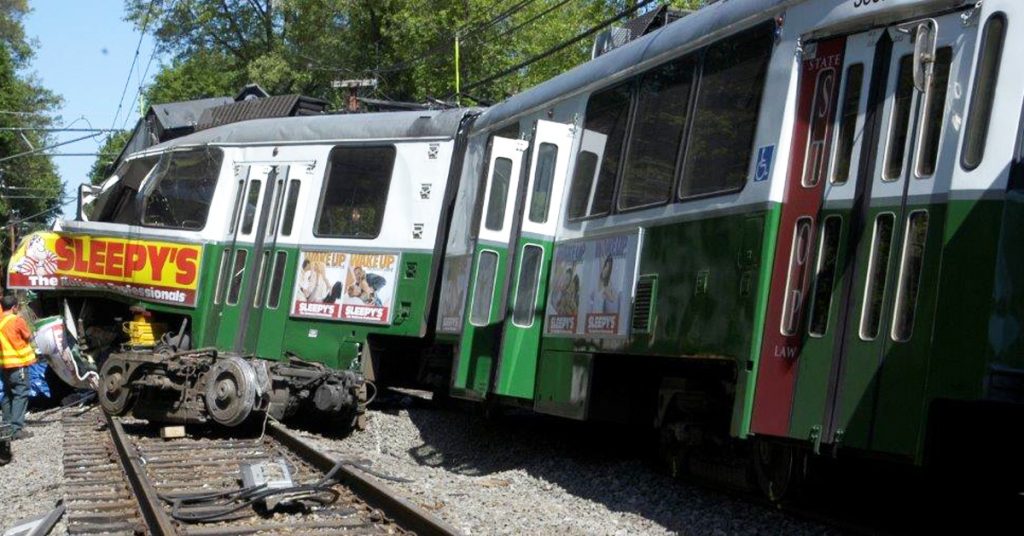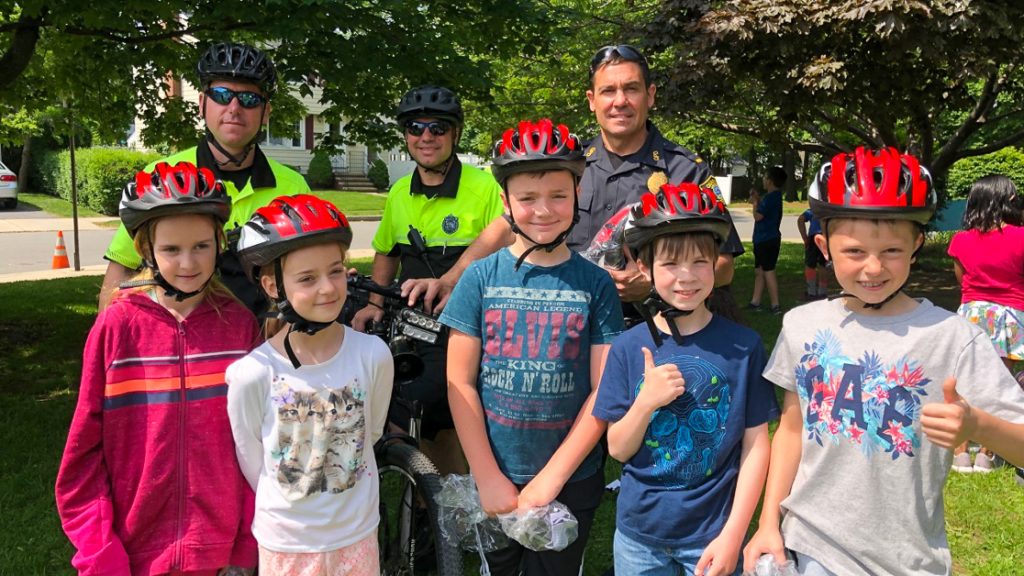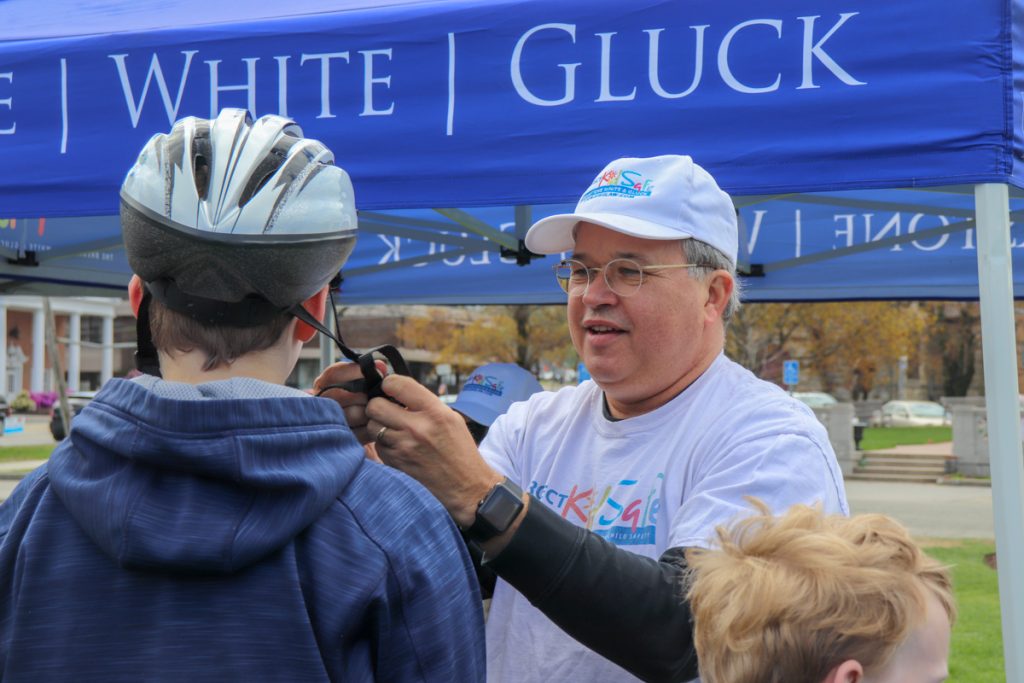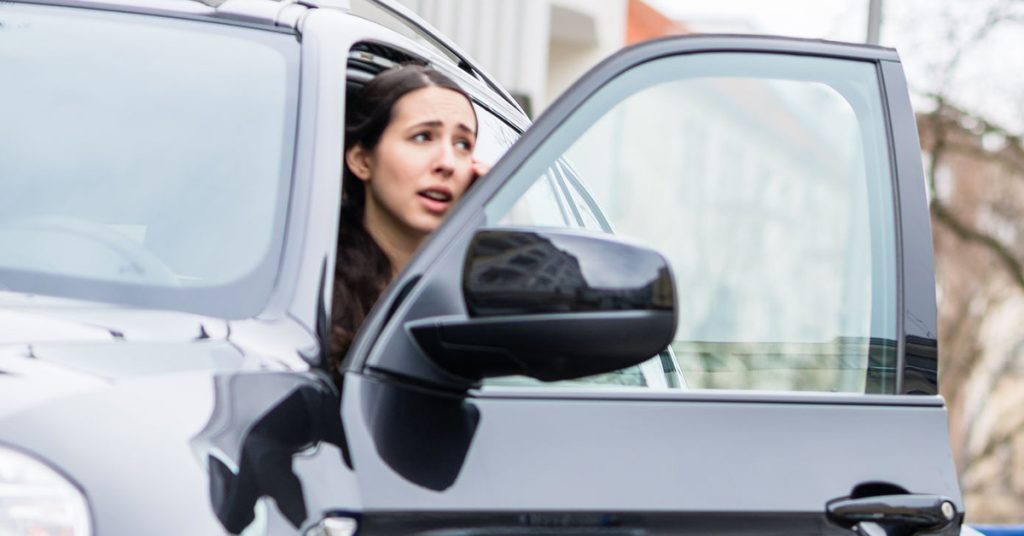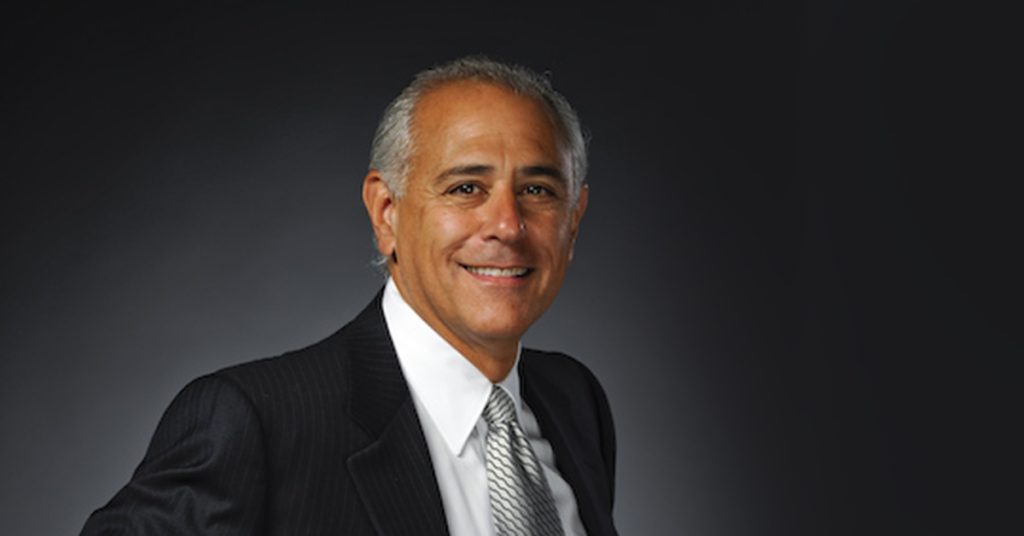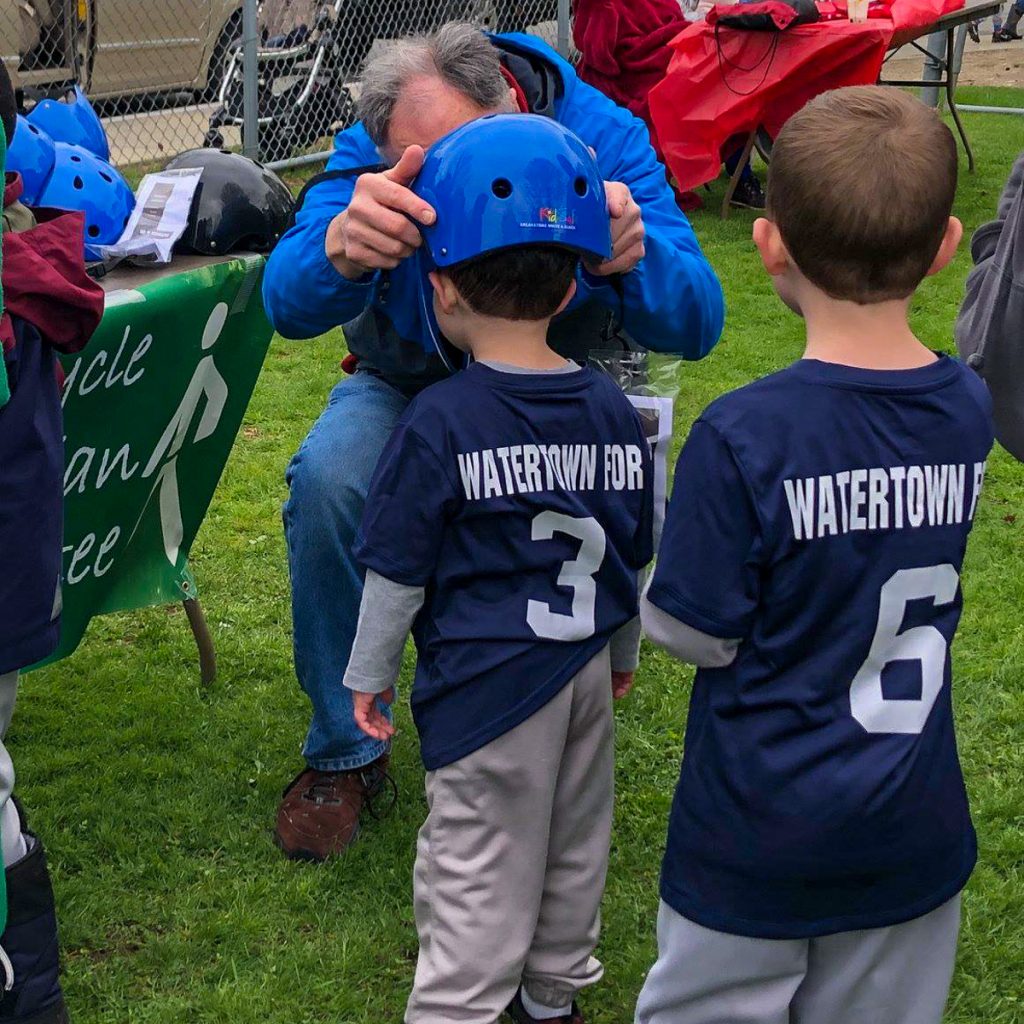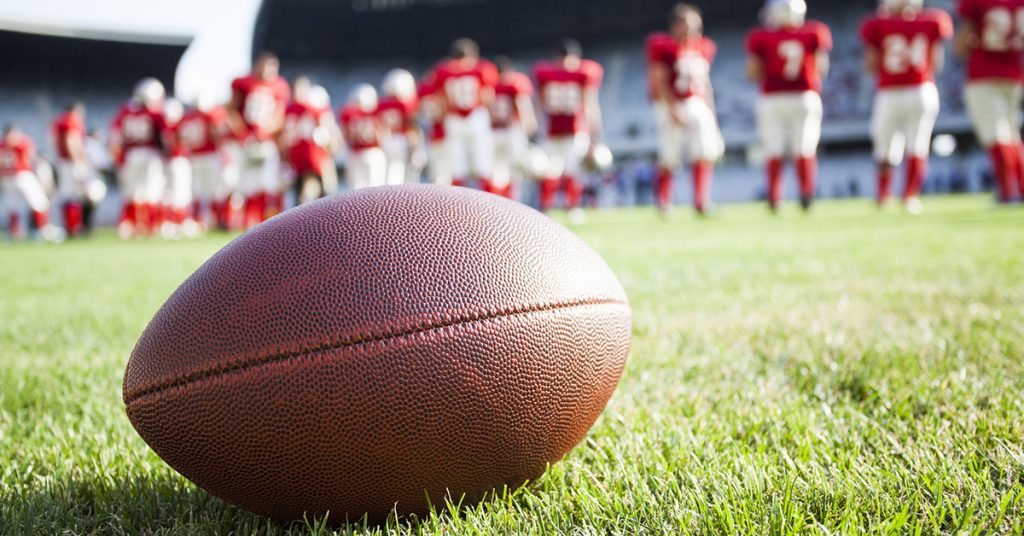Posts Tagged ‘“Boston personal injury lawyers”’
Grilling Safety at Summer Picnics and BBQs in Massachusetts

The first rule of grill safety: never leave your BBQ unattended.
As we approach the Fourth of July, many of us have grilling on our minds, and all the delights of summer BBQs. If you plan to grill, we hope you enjoy, but please remember to follow the rules of safety at all times.
This is the time to plan, because as we enjoy friends and family, July is the peak month for grill fires, the weeks when nearly 20 percent of all grill fires across the U.S. happen, according to the National Fire Protection Association (NFPA). August is another high risk month, accounting for 12 percent of grill fires.
Though these fires are devastating and life-changing events, they don’t always make the news. But according to the Massachusetts State Fire Marshal’s office, there were 474 fires involving grills, hibachis and barbecues between 2014 and 2018. Nineteen civilians were injured and seven firefighters were hurt in the wreckage. Property damage totaled $3.8 million in losses.
Across the 50 states, firefighters responded to 10,200 home fires involving grills, hibachis and barbecues each year from 2013 to 2017. Ten civilians were killed and 160 were injured. Property damage resulted in $123 million in losses.
Grilling Safety Tips
Compiled From the Massachusetts State Fire Marshal’s Office and Other Sources
- Only use propane and charcoal grills outdoors.
- Never leave your grill unattended.
- Keep a fire extinguisher nearby.
- Grills should be set up at least 10 feet away from the house or deck railings.
- Gas grills can be used on first-floor decks and patios, but they must be located on the ground level or have an outdoor stairway leading to the ground.
- Grills should never be set up under a roof overhang or low-hanging tree branches.
- Grills should not be used on fire escapes.
- Take additional precautions around children. Keep matches and lighters out of their reach. Create a circle of safety, keeping children and pets at least three feet away (more space is better).
- Do your grilling at least three feet away from tables and furniture. Fold grill covers and remove them from the cooking area.
Safe Handling of Propane Tanks
- Never smoke while handling or cooking with a propane cylinder.
- Keep propane tanks outdoors at all times, at least 10 feet distance from doors and other building openings. This includes windows and dryer vents.
- Keep propane tanks at least 20 feet from air intake vents and ignition sources.
- Propane cylinders should be stored outdoors in shady areas. Cylinders should not be used or kept in high temperatures.
- Replace propane cylinders that are aging, rusting or showing other wear and tear.
Charcoal Grills
- As with other grills, only use charcoal grills outdoors.
- When using charcoal grills, only use charcoal starter fluid. Never use gasoline or kerosene.
- Never add lighter fluid to hot coals. This can cause a flash fire, causing serious skin burns.
- Use charcoal grills in open outdoor decks and patios, just as you would gas grills. Be aware that charcoal briquettes emit carbon monoxide, a clear, odor-free gas which can accumulate in spaces and be deadly. Charcoal grills should never be placed in close quarters near an open window.
- Allow the grill to cool. After 48 hours pass, you can safely dispose of coals.
- If you cannot wait 48 hours, soak the coals in water, then place them in a metal container.
Maintaining Grills
- Review the product manual and instructions that come with your grill.
- Start by opening your grill to see if there is any animal activity or unexpected conditions.
- Next, check that your propane tank is safe for use. Dab soapy water on your propane tank and turn it on for a moment. If there is bubbling, you may have a potential leak. This should be done carefully. Before you try, watch a National Fire Protection Association video.
- Check that connections are tight before you turn the gas on.
- Clean the grease trap every time you grill.
Rooftop Grilling
Rooftop grilling is against the law in Massachusetts. When someone tries to grill on a rooftop, the damage can be deadly and exponential. Some may still remember the 2010 gas grill fire explosion that exploded and lit up the sky over Charlestown. Starting the fire was an illegal propane tank which exploded on a residential building’s rooftop. Soon after, three other illegal gas tanks burst nearby, igniting a 4-alarm blaze which move through several buildings.
Firefighters – 125 in all – battled the fire on a 100-degree Boston day. Nine firefighters and two civilians were treated for heat exhaustion injuries.
Maintain Safe Decks and Porches
Grill fires can happen when someone makes a mistake while cooking, when a child gets too close to the grill or if the grill has a product defect. Landlords may be held responsible in certain grill fires if they keep a defective grill or fail to meet building codes and illegally close off access ways. In Massachusetts, most residential properties are also required to have working smoke alarms on each floor of floor, including inside bedrooms and other areas. They must also have working carbon monoxide detectors.
You cannot always prevent negligence in these situations. But you may be able to minimize many injuries by providing yourself a little more room to work and taking it slow. Keep the grill area and walkways leading there open and clear. When you take grill covers off, set them in safe areas away from the grill. Finally, tell everyone in your home you are grilling and ask another adult to watch children.
Sources for this blog include:
Grilling Safety, Mass.gov
Getting Fired Up for Grilling Safety, Massachusetts State Fire Marshal’s Office
National Fire Protection Association
About Breakstone, White & Gluck
Breakstone, White & Gluck is a Boston personal injury law firm with expertise in premises liability and product liability cases. With more than 100 years combined experience, our attorneys have been recognized as top-rated personal injury lawyers in Massachusetts. Through our Project KidSafe campaign, we also work to bring safety information to individuals and families to help them make safe choices.
If you have been seriously injured by the negligence of someone else, learn your legal rights for seeking compensation. For a free legal consultation, contact us at 800-379-1244 or 617-723-7676 or use our contact form.
MBTA Derailments Cause Boston Commuters Injuries, Stress and Delays
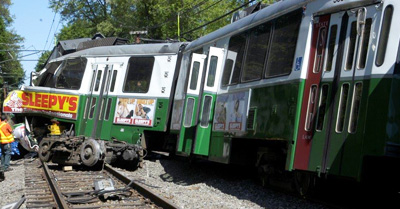
The MBTA saw 43 train derailments over five years, many Green Line trolley derailments. (File photo: bwglaw.com)
Two MBTA subway derailments have injured over a dozen and shaken hundreds of Boston commuters over the past week. At least 12 of the injured passengers were transported to local hospitals. You are not alone if you are watching and wondering if Boston’s subways are safe for use.
According to news reports, the first derailment happened over the weekend (June 9, 2019), when a Green Line trolley derailed in a tunnel near Kenmore Square. This accident happened about 11 a.m. Police and firefighters aided 150 passengers off the derailed trolley and out of the dark tunnel. Another 500 startled passengers were evacuated from other trolleys along the Green Line. Eleven people were injured, with 10 people sent to local hospitals. The Green Line trolley operator was among those injured.
Soon after, The Boston Globe reported the train derailment was not due to aging infrastructure or equipment, but was “operator-related.” The MBTA suspended the 62-year-old operator pending the outcome of the investigation.
WHDH reported the operator had three years of experience operating trains. Meanwhile, The Boston Globe reported the train derailed after the outbound D Line train left Kenmore Square. The trolley operator approached a signal marking where the D and C lines split (near Beacon Street and Commonwealth Avenue). He kept traveling over a switch that was in the process of switching between the lines.
Then Tuesday morning (June 11, 2019), a Red Line train derailed near the UMass Boston campus and the John F. Kennedy presidential library. About 60 passengers were evacuated. Despite the terrifying scene, just two people were treated for injuries. One was treated for a hand injury at the scene. Another person initially left the crash scene, then returned, asking to be transported to a hospital for neck pain.
Crews were still working to repair the Red Line damage Wednesday, leaving hundreds of commuters without their usual way into Boston. The Red Line provides services through Quincy, downtown Boston and Cambridge. The line ends at Alewife station.
The 39-year-old operator has been taken off duty pending the outcome of the investigation, according to WHDH.
According to MBTA ridership figures, the red line carried 272,000 people daily in 2013. This makes it the busiest subway line. The Green Line was second, with 227,000 passengers. The Green Line and the Mattapan Line are the only light-rail trolley systems.
Unfortunately, MBTA train derailments are more common than the public may realize. The Boston Globe reports MBTA trains have derailed 43 times over the past five years. This is the second-worst safety record in the U.S.
Train derailments must be thoroughly investigated by an experienced lawyer. Causes can include operator error, cell phone use, texting or speeding. Aging infrastructure and equipment failure are other potential causes.
If You Were Injured in a MBTA Train Derailment
If you were injured, it is in your best interest to receive a medical evaluation from a hospital or your physician. Then consult an experienced MBTA accident lawyer and learn your legal rights.
With more than 100 years combined experience, Breakstone, White & Gluck is experienced in representing individuals who have been injured by the MBTA. Our attorneys have investigated and represented clients injured by Green Line trolley collisions, MBTA bus crashes and other accidents. We have also represented families who have lost loved ones in MBTA accidents.
For a free legal consultation, contact Breakstone, White & Gluck at 800-379-1244 or 617-723-7676. You can also use our contact form.
Breakstone, White & Gluck and Quincy Police Give Away 100 Free Bicycle Helmets to Students at Merrymount School
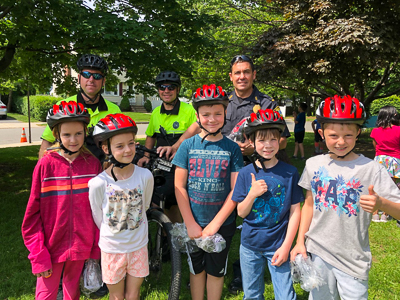 Quincy Police officers visited Merrymount School last week, speaking to children about bicycle safety in the city, and making the critical commitment to wear a bicycle helmet every time they ride. Quincy police officers talked to students at all grade levels, then gave away 100 bicycle helmets donated by Breakstone, White & Gluck’s Project KidSafe campaign.
Quincy Police officers visited Merrymount School last week, speaking to children about bicycle safety in the city, and making the critical commitment to wear a bicycle helmet every time they ride. Quincy police officers talked to students at all grade levels, then gave away 100 bicycle helmets donated by Breakstone, White & Gluck’s Project KidSafe campaign.
We are pleased to make this donation just in time for summer. This is the third year Breakstone, White & Gluck has partnered with the Quincy Police Department to encourage children and families to wear bicycle helmets to protect against head injuries. Breakstone, White & Gluck founded our Project KidSafe campaign in 2013, with a goal of helping children ride safely. Our attorneys have since given away more than 25,000 bicycle helmets to help children in the Boston area and across Massachusetts.
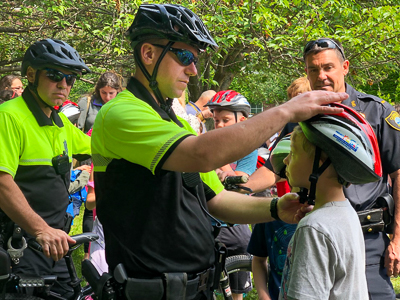
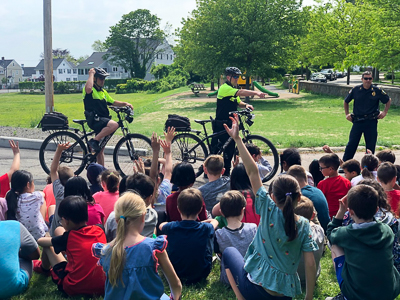
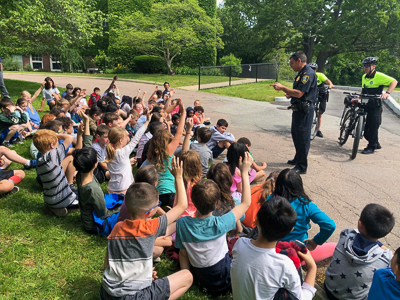
Photos are courtesy of the Quincy Police Department.
How to Fit a Bicycle Helmet
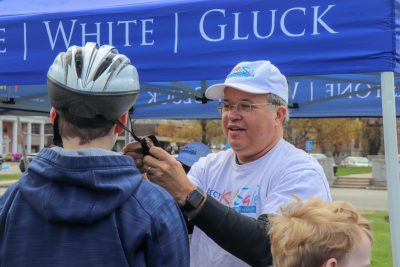
Attorney David W. White fitting helmets at Framingham Earth Day 2019. Part of Breakstone, White & Gluck’s Project KidSafe campaign to prevent head injuries.
While many people enjoy cycling, very few enjoy the process of selecting and fitting a bicycle helmet. The challenge is even greater for parents who have to find helmets for their children.
Breakstone, White & Gluck launched our Project KidSafe campaign in 2013 to help children and families, along with other cyclists, overcome some of the challenges. Read some of our tips for getting started with a bicycle helmet which fits and protects:
- Before you shop, find a flexible tape measure and measure around your head. Measure from about an inch above your eyebrows.
- Rather than shopping online, try to purchase a helmet at a local bicycle shop. Ask the staff to help you fit it properly.
- Before you purchase, ask if the helmet meets the safety standards set by the Consumer Product Safety Commission.
- Don’t share bicycle helmets. Each cyclist should have their own helmet.
- Store your helmet inside and avoid exposing it to heat in sunlight unless you are wearing it. Don’t leave it in your car for any extended period.
- Replace bicycle helmets when they become worn or if you or your child outgrow yours. You may want to consider buying a new helmet every three years. From the outside, your helmet may appear to be in good condition. Yet the protective material inside can deteriorate without any visible signs.
- Immediately replace bicycle helmets which hit the ground in a bicycle accident or fall.
- Carry your bicycle helmet if you want to use a bikeshare. Make it a rule not to rent a bike without a helmet.
- Plan ahead: Keep an extra bicycle helmet at work or at home.
- Remember, parents who wear helmets encourage children to wear helmets.
- Take children to bicycle safety events in the community to encourage their interest in cycling and safety.
About Breakstone, White & Gluck
Breakstone, White & Gluck is a Boston personal injury law firm which represents those injured by the negligence and wrongdoing of others across Massachusetts. After more than two decades of representing cyclists who have been injured, the firm’s partners launched the Project KidSafe campaign to help prevent injuries on bikes and encourage children to wear helmets throughout their lives. The firm specializes in all areas of personal injury law.
Learn more about our attorneys.
Learn more about the Project KidSafe campaign.
Watch a video demonstrating how to fit a bicycle helmet.
Lyft Works to Prevent Dooring Injuries to Bicyclists with New App Feature

Drivers are encouraged to watch for cyclists before they open vehicle doors because they could cause a dooring accident and seriously injure a cyclist.
In 2016, Cambridge resident Michael Charney began to push the Dutch Reach method for safely exiting vehicles in Massachusetts. His advocacy has greatly raised awareness about the technique, which encourages drivers and passengers to take a few simple steps and look for cyclists before opening their car doors (you can watch a quick video demonstration on his website). The goal is to prevent dooring injuries to cyclists. Now, he and other cyclists in the Boston area are celebrating another push forward: the rideshare company Lyft has added a notification to its app, alerting passengers stepping out of vehicles to look for cyclists.
“I’m delighted to see that Lyft has embraced the Dutch Reach, and the term Dutch Reach,” Charney told The Boston Globe.
Lyft has added the new feature in response to feedback from transportation advocates all over the country. In Massachusetts, a coalition of Boston-area cycling groups and committees teamed up in February and sent letters to both Uber and Lyft, reminding them that drivers have a responsibility not to obstruct bike lanes under Massachusetts law (M.G.L c. 89 § 4D). More than a dozen groups signed on, including the Somerville Bicycle Committee, MassBike, Boston Cyclists Union, Arlington Bicycle Advisory Commission, Medford Bicycle Advisory Commission and Bikes Not Bombs.
The coalition had called for the rideshare companies to take six steps:
- Create the new app feature, which pushes warnings to passengers as they step out.
- Educate drivers on their responsibility not to block bike lanes.
- Adopt procedures to ensure drivers obey bike lane laws and create serious consequences for violations, including loss of rideshare privileges.
- Share data regarding bike lane violations by rideshare drivers with the state and local communities.
- Add a user feedback section related to bicycle safety.
- Work with cities and towns to promote use of Loading Zones and Passenger Drop-Off Zones.
Boston and other major cities have already started creating specialized zones where rideshare passengers can safely board and exit. In March, the City of Boston announced a pilot program creating a dedicated rideshare activity zone in Fenway. Between 5 p.m. and 8 a.m., four spaces along Boylston Street, two north of Kimarnock Street and two south. During other hours, the spaces revert to metered parking. While part of the goal is preventing rideshare accidents, part of the goal is streamlining traffic flow to make things more predictable for rideshare drivers and residents.
While Lyft has added the new push notification to prevent bike dooring, both major rideshare companies have heard concerns about bicycle accidents and dooring injuries. Both companies also offer different perspectives than in the past. Both companies purchased bikeshare operating businesses to compliment their rideshare services in 2018. Uber acquired Jump and Lyft bought Motivate, becoming the largest bikeshare operator in the U.S. – and Boston. As part of the transaction, Lyft essentially became the new operator of BlueBikes, the regional bikeshare serving Boston, Somerville, Cambridge and Brookline. BlueBikes is still owned by the municipalities.
In 2018, Blue Cross Blue Shield took over as title sponsor. New Balance had been the original founding sponsor of the bike share in 2011, when it launched as Hubway (Some background: this isn’t the first time ownership of the regional bikeshare operating company has changed. Back in 2011, the original operator of Hubway was Alta Bicycles, which was then bought by Motivate, which operated the regional bike share from 2015 to last year).
Uber has not announced plans to join the bikeshare business in Massachusetts, but both companies – who went public earlier this year – have expressed interest in offering scooter rentals. Several companies have expressed interest in scooters, including Lime, the major operator of dockless bikes in the Boston area. Many companies are waiting for Massachusetts lawmakers to approve legislation clarifying their rights to rent out scooters here.
Local communities regulate bikeshares. But rideshare safety regulations come from the state. Massachusetts Gov. Charlie Baker signed the state’s first bill regulating rideshare vehicles into law in 2016. This bill required rideshare drivers to purchase minimum levels of auto insurance and required background checks for the first.
Industry regulations were a start. Now attention must be paid to safety and what’s happening on the street. We have heard from the cyclists. Other initial research has already shown that ridesharing is associated with a 2-3 percent increase in fatal traffic accidents in U.S. cities (Source: Sept. 2018 paper presented at the Stigler Center for the Study of Economy and the State at the University of Chicago Booth School of Business).
Breakstone, White & Gluck – Boston Personal Injury Lawyers
Breakstone, White & Gluck is based in Government Center in Boston. Our personal injury lawyers specialize in representing those injured in car accidents, bicycle accidents and pedestrian accidents, including those involving rideshare vehicles. For a free legal consultation, contact our attorneys and learn your rights at 800-379-1244 or 617-723-7676. You can also send us a message use our contact form.
Attorney Ronald E. Gluck Secures Financial Settlement at Trial for Client Injured by Snow Collapse
Settlement was reached during trial in Middlesex Superior Court
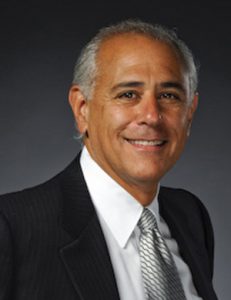
Attorney Ronald E. Gluck
Breakstone, White & Gluck successfully resolved a mild traumatic brain injury case for our client, who was injured when heavy snow collapsed from a commercial warehouse roof onto her vehicle. During the recent jury trial in Middlesex Superior Court, Attorney Ron Gluck presented testimony from multiple expert witnesses including a neurologist and a meteorologist, who testified in support of his client’s case.
Four days into the trial, the defendants made an offer that represented an 800% increase from the pre- trial offer and the case was settled at that time, just before it would have gone to the jury for deliberation. The settlement provides significant compensation for the injuries and damages that our client suffered.
Defendants
Attorney Gluck presented evidence showing that the three defendants – the property owner, the property management company, and the company that leased the warehouse – took no action to remove snow from the warehouse roof and awning following 20 to 24 inches of snowfall. Defendants had a duty to provide a safe environment for those legally visiting the property, such as our client who was making a delivery to the loading dock at the time of her injury.
Trial and Litigation
Through extensive depositions taken during the litigation it was proven that the defendant corporations failed to establish policies for snow removal from the awning, which was located directly above the loading dock, and that none of the employees of the defendant corporations had any understanding of whose responsibility it was to remove snow from the roof. As a result, snow remained on the awning after a historic snow storm and fell onto the liftgate of plaintiff’s vehicle which slammed down onto her head, causing her injuries.
At trial, it was proven that our client was instructed to park her car directly below the awning in spite of the fact that the defendant was aware that snow had fallen from the awning onto the loading dock on prior occasions and that they knew it presented a danger to anyone standing under that awning.
The evidence presented at trial established that our client suffered a traumatic brain injury which caused multiple symptoms including memory loss, mood alteration, dizziness, headaches and involuntary movement of her limbs. She underwent a long regimen of medical treatment for her injuries.
Settlement
At the beginning of the trial, the defendants denied that they were negligent and that their negligence caused our client’s injuries. But, as the trial proceeded and Attorney Gluck presented evidence, the defendants’ settlement offers grew each day until the case was settled on day four.
Breakstone, White & Gluck – Free Legal Consultation: 800-379-1244
Breakstone, White & Gluck is known for our exemplary trial experience. Not every case can be or should be settled out of court. When our attorneys go to trial, we do so with the respect of our colleagues and judges, bringing over 100 years combined experience before Massachusetts trial and appeals courts. We are known for our successful outcomes and for holding defendants, from individuals and insurance companies, to the MBTA and corporations, accountable for their negligence to our clients.
At Breakstone, White & Gluck, each of our partners has over 35 years of experience representing clients in serious personal injury claims in Massachusetts. Our attorneys have successfully presented our clients’ cases before the trial courts, the Appeals Court and the Massachusetts Supreme Judicial Court.
If you have been injured, we can advise you on whether you may have the legal right to seek compensation. For a free legal consultation, contact us at 800-379-1244 or 617-723-7676 or use our contact form.
Breakstone, White & Gluck Donates Bike Helmets for Little League Opening Day in Watertown
As part of our Project KidSafe campaign, Breakstone, White & Gluck was pleased to donate bicycle helmets in Watertown over the weekend. The Watertown Bicycle & Pedestrian Committee set up outside the Little League fields and reached out to children and parents, answering safety questions and fitting free helmets for children who needed one. Committee members gave away roughly 70 of our Project KidSafe helmets.
This is the fifth year Breakstone, White & Gluck has donated bicycle helmets in partnership with the Watertown Bicycle & Pedestrian Committee. Over the years, Breakstone, White & Gluck has given more than 500 Project KidSafe bicycle helmets to children in the Watertown community.
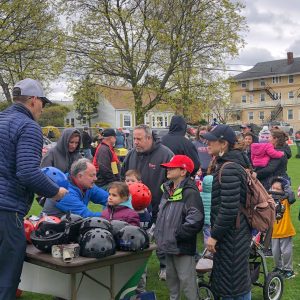
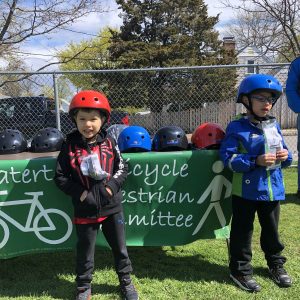
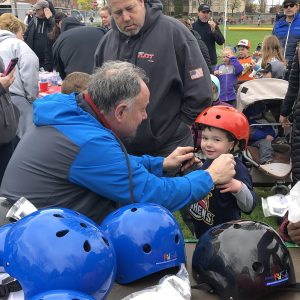
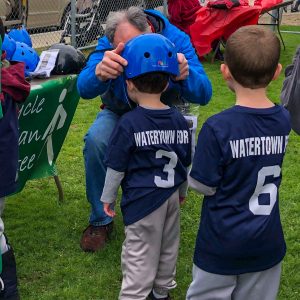
(Photo credit: Watertown Bicycle & Pedestrian Committee Facebook)
Breakstone, White & Gluck launched its Project KidSafe campaign in 2013, with a goal of keeping children safe on bikes in Massachusetts. We have since donated over 25,000 bicycle helmets to children in partnership with local bicycle committees, police departments, schools and other community organizations. Bicycle committees are a key part of our campaign, helping children and families select and fit helmets at fun and casual gatherings alongside friends and neighbors.
About Breakstone, White & Gluck
Breakstone, White & Gluck is a Boston personal injury law firm which represents individuals who have been injured by the negligence and wrongdoing of others in Massachusetts. With more than 100 years combined experience, our lawyers are recognized throughout Massachusetts and New England for their work representing those injured. We are committed to supporting bicycle safety, supporting MassBike, Boston Bicyclists Union and other Boston-area bicycle clubs.
To learn more, visit Breakstone, White & Gluck’s website or our Project KidSafe campaign.
Massachusetts Concussion Legislation Would Ban Students In Grade 7 or Younger from Playing Football
Should students have to wait until they finish 7th grade to play football in Massachusetts? Lawmakers are being asked to consider legislation to delay the start of play to protect players from concussions.
“An Act for No Organized Head Impacts to Schoolchildren,” has been filed by State representatives Paul A. Schmid III (D-8th Bristol) and Bradley H. Jones Jr. (R-20th Middlesex). The legislation would ban children in 7th grade or younger from playing or practicing any form of organized tackle football. Schools would be held accountable and face fines for violations:
- $2,000 for each violation
- $5,000 for subsequent violations
- $10,000 when serious physical harm result to participants
Children would be allowed to play flag football or any form of football which does not involve tackle play. The proposal does not include any other sport.
Causes of Concussions
The Centers for Disease Control and Prevention (CDC) define a traumatic brain injury (TBI) as a disruption to the brain caused by a blow or jolt to the head. Concussions are considered a mild TBI, which can result in a brief change of mental alertness or consciousness. A severe TBI can result in a longer period of unconsciousness or mental change.
Symptoms may not be immediately evident after a concussion, especially if the person or those around them are not familiar with the symptoms, which can include an inability to think clearly, memory problems, feeling dazed and mood, behavior or personality changes. Headaches, nausea and vomiting can also set in.
Beyond the sports field, falls are the leading cause of concussions, according to the CDC. Adults over age 65 and children under 14 are most likely to suffer a fall leading to a head injury. Car crashes are the third leading cause of concussions, followed by being struck in the head by an unspecified object, such as in a construction site accident or by violence.
Concussions can also happen on the sports field. Not every contact necessarily results in a concussion, but to identify injuries, Massachusetts and other states have already passed concussion education and training laws. Known as “return to play” laws, these require high school and middle school students to be examined by a medical professional before they can participate in sports again.
Research on Concussions and the Impact on Younger Football Players
New research shows there is a measurable impact when younger children play football. In a study of 26 football players – all age 12 – Wake Forest researchers found changes in the corpus callosum, which joins the two sides of the brain and integrates cognitive, motor and sensory functions. The players underwent MRIs to examine the changes prior to the three-month season and three months after the season concluded. They were compared to 22 other students who did not participate in contact sports.
Players who suffer a concussion need proper rest and treatment so they can properly heal and to reduce the chance for another injury. Researchers have documented this risk; one study found high school and college students who sustained concussions were four to six times more likely to suffer a second injury (Source: McGill University in Montreal).
Concussion Legislation Filed in Other States
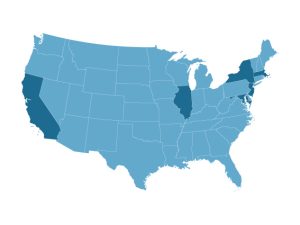
Lawmakers in Massachusetts and five other states have proposed banning tackle football for children younger than 12 or for those in seventh grade or younger. Data from Shape America.
Massachusetts isn’t taking the field alone on concussions. At least five other states are also debating tackle football bans for children under age 12. These states include Illinois, California, Maryland, New York and New Jersey, according to Boston.com. But none of the proposals are on track to reach state governors.
All 50 states already have “return to play” laws aimed at reducing youth sports-related concussions, according to the National Conference of State Legislatures. Washington state was the first to pass such a law in 2009. By 2015, every other state had enacted a similar law.
In most states, these laws mandate concussion awareness training and education to prevent concussions among student athletes. According to Shape America, 48 states require students suspected of having concussions to sit out at least 24 hours.
Arizona and South Carolina allow students back on the field the same day with a doctor’s approval.
Passed in July 2010, the Massachusetts concussion law requires parents, volunteers, coaches and school nurses to receive specialized concussion awareness training. This is to help them recognize concussion symptoms and help students receive treatment as soon as possible.
As in other states, the Massachusetts law requires medical clearance before students can return to sports. Schools are then required to maintain detailed record-keeping related to a student’s injury and progress in the classroom and on the field. The law is M.G.L. ch.111 §222. The Code of Massachusetts Regulations is 105 CMR 201.000.
All middle and high schools which offer sports through the Massachusetts Interscholastic Athletic Association (MIAA) must follow the concussion safety law.
Breakstone, White & Gluck Supports the Equal Justice Coalition’s Walk to the Hill 2019
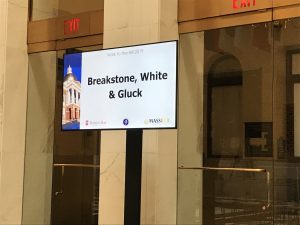
Breakstone, White & Gluck participated and supported the Equal Justice Coalition’s Walk to the Hill 2019 at the Massachusetts State House.
Breakstone, White & Gluck was pleased to support and participate in the Equal Justice Coalition’s Walk to the Hill, seeking increased funding for civil legal aid in Massachusetts. Attorney David W. White joined hundreds of lawyers at the Massachusetts State House, urging legislators to help fund free legal services to residents who cannot afford an attorney on their own. Many Massachusetts residents are not familiar with the coalition until they need help with a landlord dispute, consumer fraud or another non-criminal matter. Then the coalition’s services become critical because when someone faces criminal charges, they have the right to an attorney. But those who need representation in a civil matter are on their own. If they can’t afford a lawyer, the person could suffer devastating losses, personally and financially. With more funding for civil legal aid, the coalition and other legal aid organizations can help more individuals and families stay on track, in their homes, working, receiving medical treatment or going to school without interruption.
The Equal Justice Coalition was created in 1999 by the Boston Bar Association, the Massachusetts Bar Association and the Massachusetts Legal Assistance Corporation. Representatives from these programs participated in a speaking program in the Great Hall at the State House, before attorneys began visiting lawmakers’ offices. Speakers included Louis Tompros, chair of the Equal Justice Coalition; Lynne M. Parker, Executive Director of the Mass. Legal Assistance Corporation; Supreme Judicial Court Chief Justice Ralph Gants; Christopher Kenney, President of the Massachusetts Bar Association and Jacquelynne Bowman, Executive Director of the Greater Boston Legal Services.
Massachusetts Superior Court Judge Questions Long-Standing “Transitory Water” Doctrine
 For decades, the Massachusetts courts have adhered to the “transitory water doctrine.” Simply put, under this common law standard, Massachusetts property owners have generally been shielded from liability in slip and fall cases when an injury results from normal use in wet weather. For example, a customer who wears boots in the snow and tracks water into a store, causing another customer to slip.
For decades, the Massachusetts courts have adhered to the “transitory water doctrine.” Simply put, under this common law standard, Massachusetts property owners have generally been shielded from liability in slip and fall cases when an injury results from normal use in wet weather. For example, a customer who wears boots in the snow and tracks water into a store, causing another customer to slip.
Established more than 40 years ago, the transitory water doctrine has set the legal standard for property owners. With no incentive to avoid liability, large commercial property owners were virtually free from worries about injuries caused by water tracked in from outside. Make no mistake: many people have been badly hurt right after crossing the threshold of a store, where the water and grime are most concentrated.
But this may change, after a recent ruling by Superior Court Judge Cornelius J. Moriarty II.
Judge Moriarty recently ruled in Holden v. Wal-Mart Stores East, LLP. In February 2016, the plaintiff alleged she stepped into the Wal-Mart in Hanover and slipped on water that had accumulated on the floor. The spot where she slipped was between the door and a mat, which would have prevented the fall, but which was located a few feet from the doorway.
Wal-Mart argued the transitory water doctrine barred the plaintiff’s claim and moved for summary judgment. But Judge Moriarty denied this motion, writing that the transitory water doctrine can no longer be considered good law after the Supreme Judicial Court’s 2010 ruling in Papadopoulos vs. Target Corporation, 457 Mass. 368 (2010).
“Whether Wal-Mart made reasonable efforts to protect the plaintiff against the danger is for the jury to determine,” Moriarty wrote. The judge reasoned that Massachusetts law is moving towards a unified standard or reasonable care for property owners, and that old common law exceptions are being eliminated.
In 2010, the Supreme Judicial Court of Massachusetts abolished the century-old double standard governing who could bring claims for injuries resulting from slips and falls on snow and ice. Now, property owners have a responsibility to use reasonable care in clearing snow and ice.
Prior to Papadopoulos, Massachusetts law distinguished between injuries suffered by falls on “natural” and “unnatural” accumulations of snow and ice. Previously, a property owner was not liable for injuries caused by slip and falls on natural accumulations, so property owners had no legal incentive to clear snow in some cases. But property owners could be held liable if someone was injured by an “unnatural” accumulation, such as snow dropped by a plow or ice from a leaking gutter.
The Holden case is not yet resolved. If the case does result in a verdict against Wal-Mart, then Wal-Mart will have the option of appealing the summary judgment decision.
We believe that this is a sensible decision by Judge Moriarty, and that a uniform standard of reasonable care under all circumstances for property owners will lead to greater safety and fewer personal injuries.
Free Legal Consultation: Breakstone, White & Gluck
With more than 100 years combined experience, Breakstone, White & Gluck specializes in personal injury and medical malpractice cases in Boston and across Massachusetts. For a free legal consultation with our attorneys, contact us at 800-379-1244 or 617-723-7676 or use our contact form.


